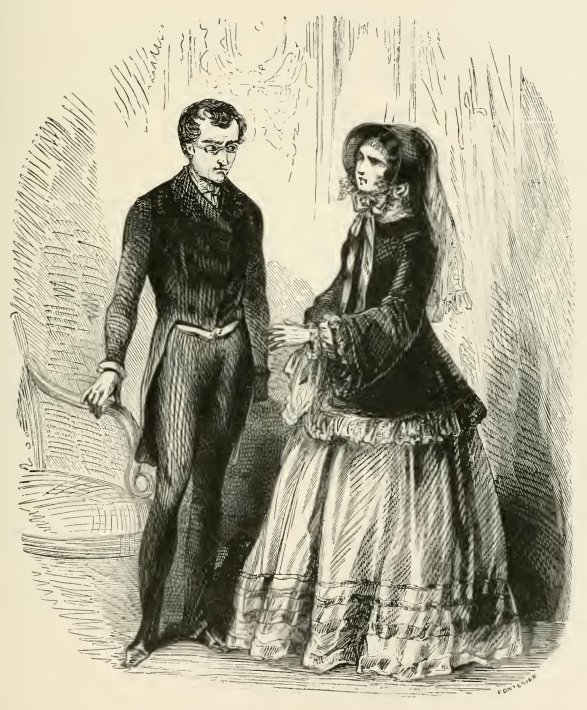


“I sleep soundly, like a child; do you not remember?”
The color mounted to the baroness’s face, and Villefort turned awfully pale.
“It is true,” said he, in so low a tone that he could hardly be heard.
“Well?” said the baroness.
“Well, I understand what I now have to do,” replied Villefort. “In less than one week from this time I will ascertain who this M. de Monte Cristo is, whence he comes, where he goes, and why he speaks in our presence of children that have been disinterred in a garden.”
Villefort pronounced these words with an accent which would have made the count shudder had he heard him. Then he pressed the hand the baroness reluctantly gave him, and led her respectfully back to the door. Madame Danglars returned in another cab to the passage, on the other side of which she found her carriage, and her coachman sleeping peacefully on his box while waiting for her.
The same day during the interview between Madame Danglars and the procureur, a travelling-carriage entered the Rue du Helder, passed through the gateway of No. 27, and stopped in the yard. In a moment the door was opened, and Madame de Morcerf alighted, leaning on her son’s arm. Albert soon left her, ordered his horses, and having arranged his toilet, drove to the Champs-Élysées, to the house of Monte Cristo.
The count received him with his habitual smile. It was a strange thing that no one ever appeared to advance a step in that man’s favor. Those who would, as it were, force a passage to his heart, found an impassable barrier. Morcerf, who ran towards him with open arms, was chilled as he drew near, in spite of the friendly smile, and simply held out his hand. Monte Cristo shook it coldly, according to his invariable practice.
“Here I am, dear count.”
“Welcome home again.”
“I arrived an hour since.”
“From Dieppe?”
“No, from Tréport.”
“Indeed?”
“And I have come at once to see you.”
“That is extremely kind of you,” said Monte Cristo with a tone of perfect indifference.
“And what is the news?”
“You should not ask a stranger, a foreigner, for news.”
“I know it, but in asking for news, I mean, have you done anything for me?”
“Had you commissioned me?” said Monte Cristo, feigning uneasiness.
“Come, come,” said Albert, “do not assume so much indifference. It is said, sympathy travels rapidly, and when at Tréport, I felt the electric shock; you have either been working for me or thinking of me.”
“Possibly,” said Monte Cristo, “I have indeed thought of you, but the magnetic wire I was guiding acted, indeed, without my knowledge.”
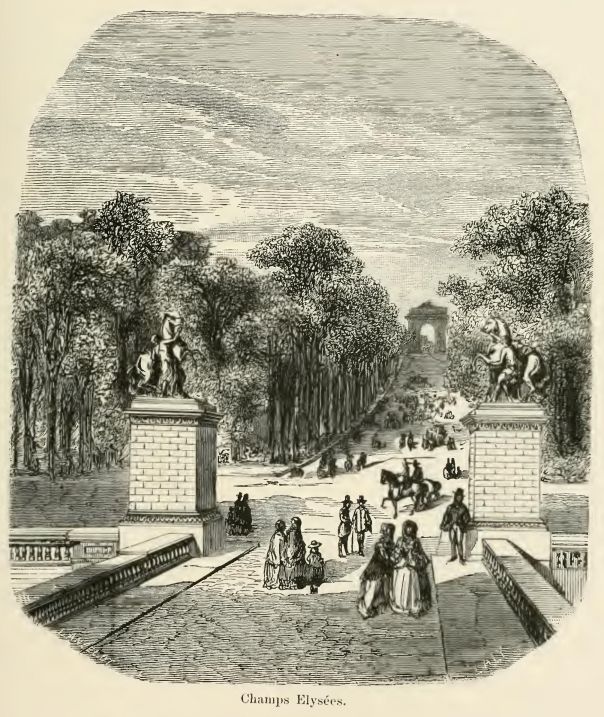

“Indeed! Pray tell me how it happened.”
“Willingly. M. Danglars dined with me.”
“I know it; to avoid meeting him, my mother and I left town.”
“But he met here M. Andrea Cavalcanti.”
“Your Italian prince?”
“Not so fast; M. Andrea only calls himself count.”
“Calls himself, do you say?”
“Yes, calls himself.”
“Is he not a count?”
“What can I know of him? He calls himself so. I, of course, give him the same title, and everyone else does likewise.”
“What a strange man you are! What next? You say M. Danglars dined here?”
“Yes, with Count Cavalcanti, the marquis his father, Madame Danglars, M. and Madame de Villefort,—charming people,—M. Debray, Maximilian Morrel, and M. de Château-Renaud.”
“Did they speak of me?”
“Not a word.”
“So much the worse.”
“Why so? I thought you wished them to forget you?”
“If they did not speak of me, I am sure they thought about me, and I am in despair.”
“How will that affect you, since Mademoiselle Danglars was not among the number here who thought of you? Truly, she might have thought of you at home.”
“I have no fear of that; or, if she did, it was only in the same way in which I think of her.”
“Touching sympathy! So you hate each other?” said the count.
“Listen,” said Morcerf—“if Mademoiselle Danglars were disposed to take pity on my supposed martyrdom on her account, and would dispense with all matrimonial formalities between our two families, I am ready to agree to the arrangement. In a word, Mademoiselle Danglars would make a charming mistress—but a wife—diable!”
“And this,” said Monte Cristo, “is your opinion of your intended spouse?”
“Yes; it is rather unkind, I acknowledge, but it is true. But as this dream cannot be realized, since Mademoiselle Danglars must become my lawful wife, live perpetually with me, sing to me, compose verses and music within ten paces of me, and that for my whole life, it frightens me. One may forsake a mistress, but a wife,—good heavens! There she must always be; and to marry Mademoiselle Danglars would be awful.”
“You are difficult to please, viscount.”
“Yes, for I often wish for what is impossible.”
“What is that?”
“To find such a wife as my father found.”
Monte Cristo turned pale, and looked at Albert, while playing with some magnificent pistols.
“Your father was fortunate, then?” said he.
“You know my opinion of my mother, count; look at her,—still beautiful, witty, more charming than ever. For any other son to have stayed with his mother for four days at Tréport, it would have been a condescension or a martyrdom, while I return, more contented, more peaceful—shall I say more poetic!—than if I had taken Queen Mab or Titania as my companion.”
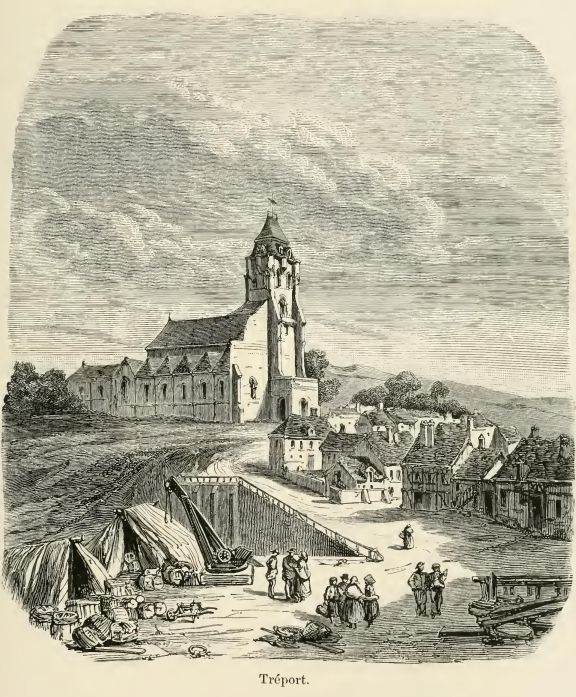

“That is an overwhelming demonstration, and you would make everyone vow to live a single life.”
“Such are my reasons for not liking to marry Mademoiselle Danglars. Have you ever noticed how much a thing is heightened in value when we obtain possession of it? The diamond which glittered in the window at Marlé’s or Fossin’s shines with more splendor when it is our own; but if we are compelled to acknowledge the superiority of another, and still must retain the one that is inferior, do you not know what we have to endure?”
“Worldling,” murmured the count.
“Thus I shall rejoice when Mademoiselle Eugénie perceives I am but a pitiful atom, with scarcely as many hundred thousand francs as she has millions.” Monte Cristo smiled. “One plan occurred to me,” continued Albert; “Franz likes all that is eccentric; I tried to make him fall in love with Mademoiselle Danglars; but in spite of four letters, written in the most alluring style, he invariably answered: ‘My eccentricity may be great, but it will not make me break my promise.’”
“That is what I call devoted friendship, to recommend to another one whom you would not marry yourself.” Albert smiled.
“Apropos,” continued he, “Franz is coming soon, but it will not interest you; you dislike him, I think?”
“I?” said Monte Cristo; “my dear viscount, how have you discovered that I did not like M. Franz! I like everyone.”
“And you include me in the expression everyone—many thanks!”
“Let us not mistake,” said Monte Cristo; “I love everyone as God commands us to love our neighbor, as Christians; but I thoroughly hate but a few. Let us return to M. Franz d’Épinay. Did you say he was coming?”
“Yes; summoned by M. de Villefort, who is apparently as anxious to get Mademoiselle Valentine married as M. Danglars is to see Mademoiselle Eugénie settled. It must be a very irksome office to be the father of a grown-up daughter; it seems to make one feverish, and to raise one’s pulse to ninety beats a minute until the deed is done.”
“But M. d’Épinay, unlike you, bears his misfortune patiently.”
“Still more, he talks seriously about the matter, puts on a white tie, and speaks of his family. He entertains a very high opinion of M. and Madame de Villefort.”
“Which they deserve, do they not?”
“I believe they do. M. de Villefort has always passed for a severe but a just man.”
“There is, then, one,” said Monte Cristo, “whom you do not condemn like poor Danglars?”
“Because I am not compelled to marry his daughter perhaps,” replied Albert, laughing.
“Indeed, my dear sir,” said Monte Cristo, “you are revoltingly foppish.”
“I foppish? how do you mean?”
“Yes; pray take a cigar, and cease to defend yourself, and to struggle to escape marrying Mademoiselle Danglars. Let things take their course; perhaps you may not have to retract.”
“Bah!” said Albert, staring.
“Doubtless, my dear viscount, you will not be taken by force; and seriously, do you wish to break off your engagement?”
“I would give a hundred thousand francs to be able to do so.”
“Then make yourself quite easy. M. Danglars would give double that sum to attain the same end.”
“Am I, indeed, so happy?” said Albert, who still could not prevent an almost imperceptible cloud passing across his brow. “But, my dear count, has M. Danglars any reason?”
“Ah! there is your proud and selfish nature. You would expose the self-love of another with a hatchet, but you shrink if your own is attacked with a needle.”
“But yet, M. Danglars appeared——”
“Delighted with you, was he not? Well, he is a man of bad taste, and is still more enchanted with another. I know not whom; look and judge for yourself.”
“Thank you, I understand. But my mother—no, not my mother; I mistake—my father intends giving a ball.”
“A ball at this season?”
“Summer balls are fashionable.”
“If they were not, the countess has only to wish it, and they would become so.”
“You are right; You know they are select affairs; those who remain in Paris in July must be true Parisians. Will you take charge of our invitation to Messieurs Cavalcanti?”
“When will it take place?”
“On Saturday.”
“M. Cavalcanti’s father will be gone.”
“But the son will be here; will you invite young M. Cavalcanti?”
“I do not know him, viscount.”
“You do not know him?”
“No, I never saw him until a few days since, and am not responsible for him.”
“But you receive him at your house?”
“That is another thing: he was recommended to me by a good abbé, who may be deceived. Give him a direct invitation, but do not ask me to present him. If he were afterwards to marry Mademoiselle Danglars, you would accuse me of intrigue, and would be challenging me,—besides, I may not be there myself.”
“Where?”
“At your ball.”
“Why should you not be there?”
“Because you have not yet invited me.”
“But I come expressly for that purpose.”
“You are very kind, but I may be prevented.”
“If I tell you one thing, you will be so amiable as to set aside all impediments.”
“Tell me what it is.”
“My mother begs you to come.”
“The Comtesse de Morcerf?” said Monte Cristo, starting.
“Ah, count,” said Albert, “I assure you Madame de Morcerf speaks freely to me, and if you have not felt those sympathetic fibres of which I spoke just now thrill within you, you must be entirely devoid of them, for during the last four days we have spoken of no one else.”
“You have talked of me?”
“Yes, that is the penalty of being a living puzzle!”
“Then I am also a puzzle to your mother? I should have thought her too reasonable to be led by imagination.”
“A problem, my dear count, for everyone—for my mother as well as others; much studied, but not solved, you still remain an enigma, do not fear. My mother is only astonished that you remain so long unsolved. I believe, while the Countess G—— takes you for Lord Ruthven, my mother imagines you to be Cagliostro or the Count Saint-Germain. The first opportunity you have, confirm her in her opinion; it will be easy for you, as you have the philosophy of the one and the wit of the other.”
“I thank you for the warning,” said the count; “I shall endeavor to be prepared for all suppositions.”
“You will, then, come on Saturday?”
“Yes, since Madame de Morcerf invites me.”
“You are very kind.”
“Will M. Danglars be there?”
“He has already been invited by my father. We shall try to persuade the great d’Aguesseau,11 M. de Villefort, to come, but have not much hope of seeing him.”
“‘Never despair of anything,’ says the proverb.”
“Do you dance, count?”
“I dance?”
“Yes, you; it would not be astonishing.”
“That is very well before one is over forty. No, I do not dance, but I like to see others do so. Does Madame de Morcerf dance?”
“Never; you can talk to her, she so delights in your conversation.”
“Indeed?”
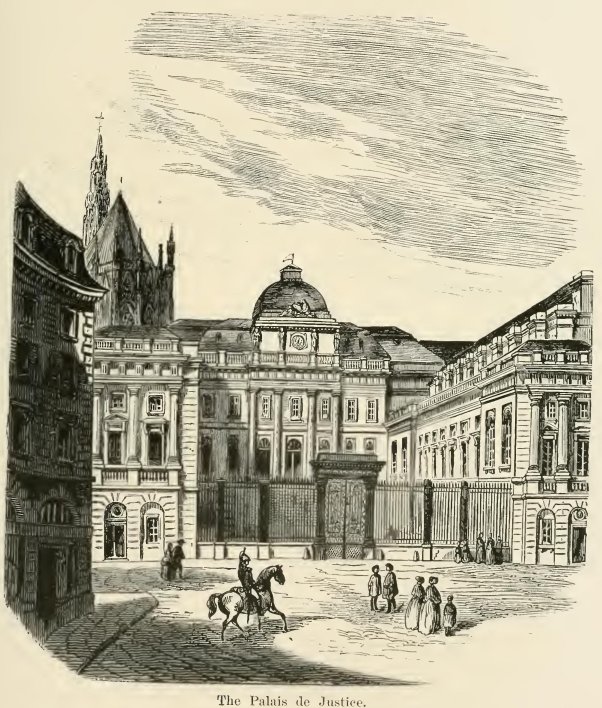

“Yes, truly; and I assure you. You are the only man of whom I have heard her speak with interest.” Albert rose and took his hat; the count conducted him to the door.
“I have one thing to reproach myself with,” said he, stopping Albert on the steps. “What is it?”
“I have spoken to you indiscreetly about Danglars.”
“On the contrary, speak to me always in the same strain about him.”
“I am glad to be reassured on that point. Apropos, when do you aspect M. d’Épinay?”
“Five or six days hence at the latest.”
“And when is he to be married?”
“Immediately on the arrival of M. and Madame de Saint-Méran.”
“Bring him to see me. Although you say I do not like him, I assure you I shall be happy to see him.”
“I will obey your orders, my lord.”
“Good-bye.”
“Until Saturday, when I may expect you, may I not?”
“Yes, I promised you.” The Count watched Albert, waving his hand to him. When he had mounted his phaeton, Monte Cristo turned, and seeing Bertuccio, “What news?” said he.
“She went to the Palais,” replied the steward.
“Did she stay long there?”
“An hour and a half.”
“Did she return home?”
“Directly.”
“Well, my dear Bertuccio,” said the count, “I now advise you to go in quest of the little estate I spoke to you of in Normandy.”
Bertuccio bowed, and as his wishes were in perfect harmony with the order he had received, he started the same evening.
M. de Villefort kept the promise he had made to Madame Danglars, to endeavor to find out how the Count of Monte Cristo had discovered the history of the house at Auteuil. He wrote the same day for the required information to M. de Boville, who, from having been an inspector of prisons, was promoted to a high office in the police; and the latter begged for two days time to ascertain exactly who would be most likely to give him full particulars. At the end of the second day M. de Villefort received the following note:
“The person called the Count of Monte Cristo is an intimate acquaintance of Lord Wilmore, a rich foreigner, who is sometimes seen in Paris and who is there at this moment; he is also known to the Abbé Busoni, a Sicilian priest, of high repute in the East, where he has done much good.”
M. de Villefort replied by ordering the strictest inquiries to be made respecting these two persons; his orders were executed, and the following evening he received these details:
“The abbé, who was in Paris only for a month, inhabited a small two-storied house behind Saint-Sulpice; there were two rooms on each floor and he was the only tenant. The two lower rooms consisted of a dining-room, with a table, chairs, and side-board of walnut, and a wainscoted parlor, without ornaments, carpet, or timepiece. It was evident that the abbé limited himself to objects of strict necessity. He preferred to use the sitting-room upstairs, which was more library than parlor, and was furnished with theological books and parchments, in which he delighted to bury himself for months at a time, according to his valet de chambre. His valet looked at the visitors through a sort of wicket; and if their faces were unknown to him or displeased him, he replied that the abbé was not in Paris, an answer which satisfied most persons, because the abbé was known to be a great traveller. Besides, whether at home or not, whether in Paris or Cairo, the abbé always left something to give away, which the valet distributed through this wicket in his master’s name. The other room near the library was a bedroom. A bed without curtains, four armchairs, and a couch, covered with yellow Utrecht velvet, composed, with a prie-Dieu, all its furniture.
“Lord Wilmore resided in Rue Fontaine-Saint-Georges. He was one of those English tourists who consume a large fortune in travelling. He hired the apartment in which he lived furnished, passed only a few hours in the day there, and rarely slept there. One of his peculiarities was never to speak a word of French, which he however wrote with great facility.”
The day after this important information had been given to the king’s attorney, a man alighted from a carriage at the corner of the Rue Férou, and rapping at an olive-green door, asked if the Abbé Busoni were within.
“No, he went out early this morning,” replied the valet.
“I might not always be content with that answer,” replied the visitor, “for I come from one to whom everyone must be at home. But have the kindness to give the Abbé Busoni——”
“I told you he was not at home,” repeated the valet.
“Then on his return give him that card and this sealed paper. Will he be at home at eight o’clock this evening?”
“Doubtless, unless he is at work, which is the same as if he were out.”
“I will come again at that time,” replied the visitor, who then retired.
At the appointed hour the same man returned in the same carriage, which, instead of stopping this time at the end of the Rue Férou, drove up to the green door. He knocked, and it opened immediately to admit him. From the signs of respect the valet paid him, he saw that his note had produced a good effect.
“Is the abbé at home?” asked he.
“Yes; he is at work in his library, but he expects you, sir,” replied the valet. The stranger ascended a rough staircase, and before a table, illumined by a lamp whose light was concentrated by a large shade while the rest of the apartment was in partial darkness, he perceived the abbé in a monk’s dress, with a cowl on his head such as was used by learned men of the Middle Ages.
“Have I the honor of addressing the Abbé Busoni?” asked the visitor.
“Yes, sir,” replied the abbé; “and you are the person whom M. de Boville, formerly an inspector of prisons, sends to me from the prefect of police?”
“Exactly, sir.”
“One of the agents appointed to secure the safety of Paris?”
“Yes, sir” replied the stranger with a slight hesitation, and blushing.
The abbé replaced the large spectacles, which covered not only his eyes but his temples, and sitting down motioned to his visitor to do the same. “I am at your service, sir,” said the abbé, with a marked Italian accent.
“The mission with which I am charged, sir,” replied the visitor, speaking with hesitation, “is a confidential one on the part of him who fulfils it, and him by whom he is employed.” The abbé bowed. “Your probity,” replied the stranger, “is so well known to the prefect that he wishes as a magistrate to ascertain from you some particulars connected with the public safety, to ascertain which I am deputed to see you. It is hoped that no ties of friendship or humane consideration will induce you to conceal the truth.”
“Provided, sir, the particulars you wish for do not interfere with my scruples or my conscience. I am a priest, sir, and the secrets of confession, for instance, must remain between me and God, and not between me and human justice.”
“Do not alarm yourself, monsieur, we will duly respect your conscience.”
At this moment the abbé pressed down his side of the shade and so raised it on the other, throwing a bright light on the stranger’s face, while his own remained obscured.
“Excuse me, abbé,” said the envoy of the prefect of the police, “but the light tries my eyes very much.” The abbé lowered the shade.
“Now, sir, I am listening—go on.”
“I will come at once to the point. Do you know the Count of Monte Cristo?”
“You mean Monsieur Zaccone, I presume?”
“Zaccone?—is not his name Monte Cristo?”
“Monte Cristo is the name of an estate, or, rather, of a rock, and not a family name.”
“Well, be it so—let us not dispute about words; and since M. de Monte Cristo and M. Zaccone are the same——”
“Absolutely the same.”
“Let us speak of M. Zaccone.”
“Agreed.”
“I asked you if you knew him?”
“Extremely well.”
“Who is he?”
“The son of a rich shipbuilder in Malta.”
“I know that is the report; but, as you are aware, the police does not content itself with vague reports.”
“However,” replied the abbé, with an affable smile, “when that report is in accordance with the truth, everybody must believe it, the police as well as all the rest.”
“Are you sure of what you assert?”
“What do you mean by that question?”
“Understand, sir, I do not in the least suspect your veracity; I ask if you are certain of it?”
“I knew his father, M. Zaccone.”
“Ah, indeed?”
“And when a child I often played with the son in the timber-yards.”
“But whence does he derive the title of count?”
“You are aware that may be bought.”
“In Italy?”
“Everywhere.”
“And his immense riches, whence does he procure them?”
“They may not be so very great.”
“How much do you suppose he possesses?”
“From one hundred and fifty to two hundred thousand livres per annum.”
“That is reasonable,” said the visitor; “I have heard he had three or four millions.”
“Two hundred thousand per annum would make four millions of capital.”
“But I was told he had four millions per annum.”
“That is not probable.”
“Do you know this Island of Monte Cristo?”
“Certainly, everyone who has come from Palermo, Naples, or Rome to France by sea must know it, since he has passed close to it and must have seen it.”
“I am told it is a delightful place?”
“It is a rock.”
“And why has the count bought a rock?”
“For the sake of being a count. In Italy one must have territorial possessions to be a count.”
“You have, doubtless, heard the adventures of M. Zaccone’s youth?”
“The father’s?”
“No, the son’s.”
“I know nothing certain; at that period of his life, I lost sight of my young comrade.”
“Was he in the wars?”
“I think he entered the service.”
“In what branch?”
“In the navy.”
“Are you not his confessor?”
“No, sir; I believe he is a Lutheran.”
“A Lutheran?”
“I say, I believe such is the case, I do not affirm it; besides, liberty of conscience is established in France.”
“Doubtless, and we are not now inquiring into his creed, but his actions; in the name of the prefect of police, I ask you what you know of him.
“He passes for a very charitable man. Our holy father, the pope, has made him a knight of Jesus Christ for the services he rendered to the Christians in the East; he has five or six rings as testimonials from Eastern monarchs of his services.”
“Does he wear them?”
“No, but he is proud of them; he is better pleased with rewards given to the benefactors of man than to his destroyers.”
“He is a Quaker then?”
“Exactly, he is a Quaker, with the exception of the peculiar dress.”
“Has he any friends?”
“Yes, everyone who knows him is his friend.”
“But has he any enemies?”
“One only.”
“What is his name?”
“Lord Wilmore.”
“Where is he?”
“He is in Paris just now.”
“Can he give me any particulars?”
“Important ones; he was in India with Zaccone.”
“Do you know his abode?”
“It’s somewhere in the Chaussée d’Antin; but I know neither the street nor the number.”
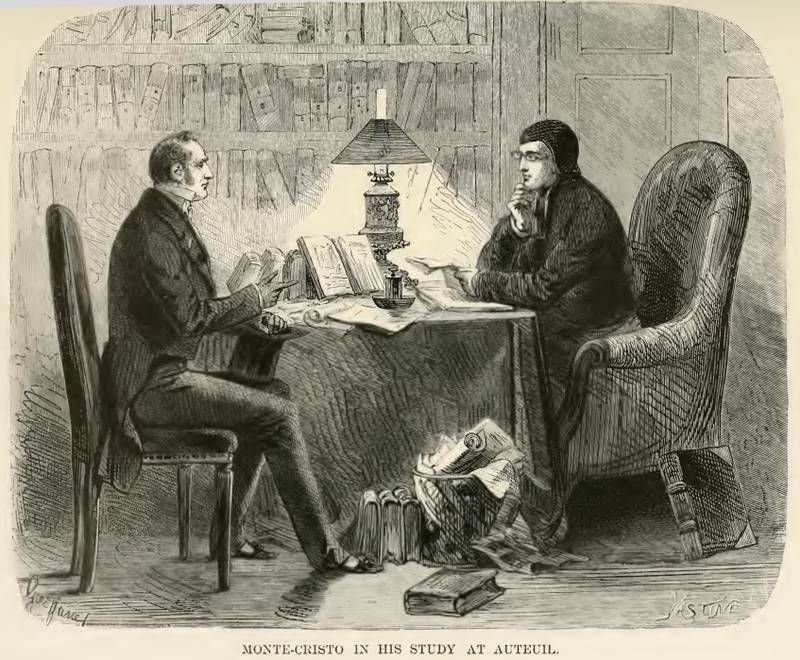

“Are you at variance with the Englishman?”
“I love Zaccone, and he hates him; we are consequently not friends.”
“Do you think the Count of Monte Cristo had ever been in France before he made this visit to Paris?”
“To that question I can answer positively; no, sir, he had not, because he applied to me six months ago for the particulars he required, and as I did not know when I might again come to Paris, I recommended M. Cavalcanti to him.”
“Andrea?”
“No, Bartolomeo, his father.”
“Now, sir, I have but one question more to ask, and I charge you, in the name of honor, of humanity, and of religion, to answer me candidly.”
“What is it, sir?”
“Do you know with what design M. de Monte Cristo purchased a house at Auteuil?”
“Certainly, for he told me.”
“What is it, sir?”
“To make a lunatic asylum of it, similar to that founded by the Count of Pisani at Palermo. Do you know about that institution?”
“I have heard of it.”
“It is a magnificent charity.” Having said this, the abbé bowed to imply he wished to pursue his studies.
The visitor either understood the abbé’s meaning, or had no more questions to ask; he arose, and the abbé accompanied him to the door.
“You are a great almsgiver,” said the visitor, “and although you are said to be rich, I will venture to offer you something for your poor people; will you accept my offering?”
“I thank you, sir; I am only jealous in one thing, and that is that the relief I give should be entirely from my own resources.”
“However——”
“My resolution, sir, is unchangeable, but you have only to search for yourself and you will find, alas, but too many objects upon whom to exercise your benevolence.”
The abbé once more bowed as he opened the door, the stranger bowed and took his leave, and the carriage conveyed him straight to the house of M. de Villefort. An hour afterwards the carriage was again ordered, and this time it went to the Rue Fontaine-Saint-Georges, and stopped at No. 5, where Lord Wilmore lived. The stranger had written to Lord Wilmore, requesting an interview, which the latter had fixed for ten o’clock. As the envoy of the prefect of police arrived ten minutes before ten, he was told that Lord Wilmore, who was precision and punctuality personified, was not yet come in, but that he would be sure to return as the clock struck.
The visitor was introduced into the drawing-room, which was like all other furnished drawing-rooms. A mantle-piece, with two modern Sèvres vases, a timepiece representing Cupid with his bent bow, a mirror with an engraving on each side—one representing Homer carrying his guide, the other, Belisarius begging—a grayish paper; red and black tapestry—such was the appearance of Lord Wilmore’s drawing-room.
It was illuminated by lamps with ground-glass shades which gave only a feeble light, as if out of consideration for the envoy’s weak sight. After ten minutes’ expectation the clock struck ten; at the fifth stroke the door opened and Lord Wilmore appeared. He was rather above the middle height, with thin reddish whiskers, light complexion and light hair, turning rather gray. He was dressed with all the English peculiarity, namely, in a blue coat, with gilt buttons and high collar, in the fashion of 1811, a white kerseymere waistcoat, and nankeen pantaloons, three inches too short, but which were prevented by straps from slipping up to the knee. His first remark on entering was:
“You know, sir, I do not speak French?”
“I know you do not like to converse in our language,” replied the envoy.
“But you may use it,” replied Lord Wilmore; “I understand it.”
“And I,” replied the visitor, changing his idiom, “know enough of English to keep up the conversation. Do not put yourself to the slightest inconvenience.”
“Aw?” said Lord Wilmore, with that tone which is only known to natives of Great Britain.
The envoy presented his letter of introduction, which the latter read with English coolness, and having finished:
“I understand,” said he, “perfectly.”
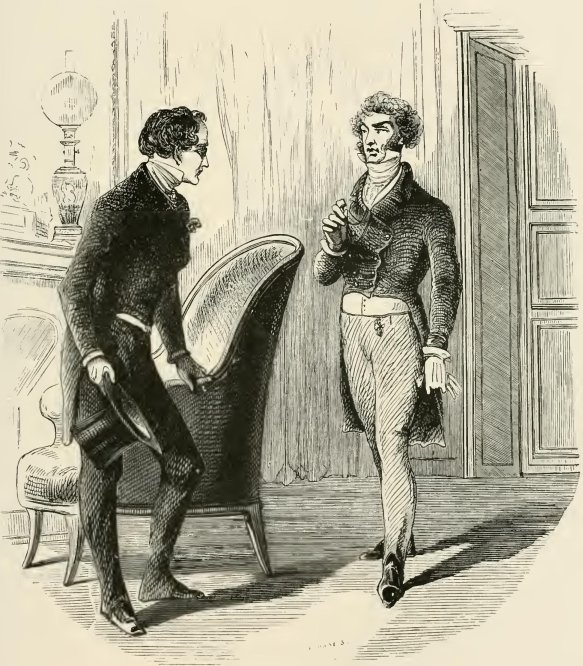

Then began the questions, which were similar to those which had been addressed to the Abbé Busoni. But as Lord Wilmore, in the character of the count’s enemy, was less restrained in his answers, they were more numerous; he described the youth of Monte Cristo, who he said, at ten years of age, entered the service of one of the petty sovereigns of India who make war on the English. It was there Wilmore had first met him and fought against him; and in that war Zaccone had been taken prisoner, sent to England, and consigned to the hulks, whence he had escaped by swimming. Then began his travels, his duels, his caprices; then the insurrection in Greece broke out, and he had served in the Grecian ranks. While in that service he had discovered a silver mine in the mountains of Thessaly, but he had been careful to conceal it from everyone. After the battle of Navarino, when the Greek government was consolidated, he asked of King Otho a mining grant for that district, which was given him. Hence that immense fortune, which, in Lord Wilmore’s opinion, possibly amounted to one or two millions per annum,—a precarious fortune, which might be momentarily lost by the failure of the mine.
“But,” asked the visitor, “do you know why he came to France?”
“He is speculating in railways,” said Lord Wilmore, “and as he is an expert chemist and physicist, he has invented a new system of telegraphy, which he is seeking to bring to perfection.”
“How much does he spend yearly?” asked the prefect.
“Not more than five or six hundred thousand francs,” said Lord Wilmore; “he is a miser.” Hatred evidently inspired the Englishman, who, knowing no other reproach to bring on the count, accused him of avarice.
“Do you know his house at Auteuil?”
“Certainly.”
“What do you know respecting it?”
“Do you wish to know why he bought it?”
“Yes.”
“The count is a speculator, who will certainly ruin himself in experiments. He supposes there is in the neighborhood of the house he has bought a mineral spring equal to those at Bagnères, Luchon, and Cauterets. He is going to turn his house into a Badhaus, as the Germans term it. He has already dug up all the garden two or three times to find the famous spring, and, being unsuccessful, he will soon purchase all the contiguous houses. Now, as I dislike him, and hope his railway, his electric telegraph, or his search for baths, will ruin him, I am watching for his discomfiture, which must soon take place.”
“What was the cause of your quarrel?”
“When he was in England he seduced the wife of one of my friends.”
“Why do you not seek revenge?”
“I have already fought three duels with him,” said the Englishman, “the first with the pistol, the second with the sword, and the third with the sabre.”
“And what was the result of those duels?”
“The first time, he broke my arm; the second, he wounded me in the breast; and the third time, made this large wound.” The Englishman turned down his shirt-collar, and showed a scar, whose redness proved it to be a recent one. “So that, you see, there is a deadly feud between us.”
“But,” said the envoy, “you do not go about it in the right way to kill him, if I understand you correctly.”
“Aw?” said the Englishman, “I practice shooting every day, and every other day Grisier comes to my house.”
This was all the visitor wished to ascertain, or, rather, all the Englishman appeared to know. The agent arose, and having bowed to Lord Wilmore, who returned his salutation with the stiff politeness of the English, he retired. Lord Wilmore, having heard the door close after him, returned to his bedroom, where with one hand he pulled off his light hair, his red whiskers, his false jaw, and his wound, to resume the black hair, dark complexion, and pearly teeth of the Count of Monte Cristo.
It was M. de Villefort, and not the prefect, who returned to the house of M. de Villefort. The procureur felt more at ease, although he had learned nothing really satisfactory, and, for the first time since the dinner-party at Auteuil, he slept soundly.